Trump Knew Of Whistleblower Complaint Before Lifting Hold On Ukraine Aid
New revelations punch a big hole in Republican defenses of the President.
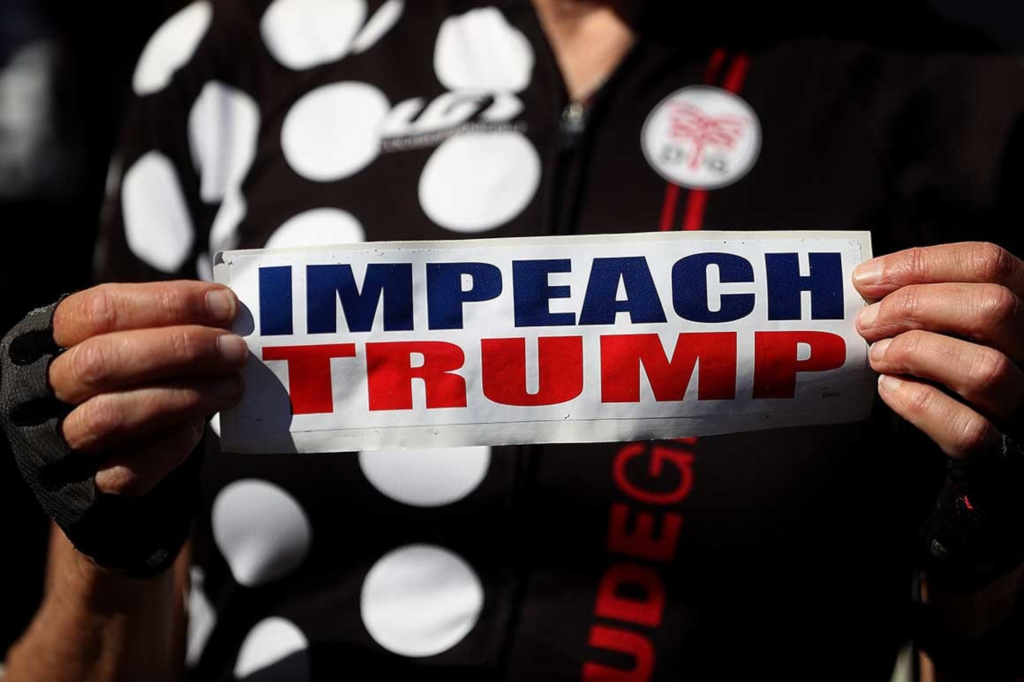
Late yesterday, The New York Times reported that President Trump was aware of the whistleblower complaint that started the investigation of the Ukraine scandal before he authorized the release of the hold on military aid to the Eastern European nation:
WASHINGTON — President Trump had already been briefed on a whistle-blower’s complaint about his dealings with Ukraine when he unfroze military aid for the country in September, according to two people familiar with the matter.
Lawyers from the White House counsel’s office told Mr. Trump in late August about the complaint, explaining that they were trying to determine whether they were legally required to give it to Congress, the people said.
The revelation could shed light on Mr. Trump’s thinking at two critical points under scrutiny by impeachment investigators: his decision in early September to release $391 million in security assistance to Ukraine and his denial to a key ambassador around the same time that there was a “quid pro quo” with Kyiv. Mr. Trump used the phrase before it had entered the public lexicon in the Ukraine affair.
Mr. Trump faced bipartisan pressure from Congress when he released the aid. But the new timing detail shows that he was also aware at the time that the whistle-blower had accused him of wrongdoing in withholding the aid and in his broader campaign to pressure Ukraine’s new president, Volodymyr Zelensky, to conduct investigations that could benefit Mr. Trump’s re-election chances.
The complaint from the whistle-blower, a C.I.A. officer who submitted it to the inspector general for the intelligence community in mid-August, put at the center of that pressure campaign a July 25 phone call between the presidents, which came at a time when Mr. Trump had already frozen the aid to the Ukrainian government. Mr. Trump asked that Mr. Zelensky “do us a favor,” then brought up the investigations he sought, alarming White House aides who conveyed their concerns to the whistle-blower.
The White House declined to comment
The timing of the President’s knowledge of the whistleblower’s complaint is significant because it tends to undercut a significant part of the Administration’s defense to the underlying changes in the Ukraine scandal. Specifically, the President and many of his supporters have pointed to a conversation testified to by Gordon Sondland, Trump’s Ambassador to the European Union, in which the President repeatedly said he wanted “No quid pro quo” from the Ukrainians and he just wanted President Zelensky to do the “right thing.” This clearly contradicts both the summary of the President’s phone call with Zelensky a month and a half earlier and the testimony of several officials, including Sondland himself, who made clear that the military aid, as well as progress in the U.S.-Ukrainian relationship that could include an invitation to the White House, was linked to Ukrainian cooperation on the Biden investigation and other issues. The fact that he knew about the complaint at the time he talked to Sondland, though, suggests that he was trying to reset the narrative prior to the whistleblower complaint becoming public:
Trump’s August knowledge about the whistle-blower complaint sheds new light on the possible motivations behind some of the key events in the whole Ukraine saga—namely the fact that Trump knew about the whistle-blower when foreign aid to Ukraine was eventually released on September 11, after previously being held up by Trump for unknown reasons. Republicans have pointed to the aid’s eventual release as a key defense against impeachment, saying that there couldn’t have been a quid pro quo plot if the White House ultimately gave Ukraine the funds without a public declaration that Ukraine would investigate the president’s rivals. The fact that Trump was well aware that his dealings with Ukraine were about to get him into trouble pokes a hole in this defense, instead playing into House Democrats’ theory that the president was acting not out of benevolence to Ukraine, but rather as a way to save himself amid mounting concerns. (The whistle-blower wasn’t the only one raising alarms about Ukraine at the time; three House committees opened an investigation into Trump’s Ukraine dealings on September 9.)
This also means that Trump was aware of the whistle-blower’s allegations when the president started vehemently denying the existence of a quid pro in conversations with his allies—and once again calls into question the motivation behind those statements. Just days after the president learned of the whistle-blower complaint, the Times reports, Trump denied extorting Ukraine in a conversation with Republican Sen. Ron Johnson. Johnson asked Trump “whether there was some kind of arrangement where Ukraine would take some action and the hold would be lifted,” the senator wrote in a letter to House investigators, and Trump responded, “(Expletive deleted)—No way. I would never do that. Who told you that?” Trump then made a similar denial in an early September phone call with Ambassador to the European Union Gordon Sondland. “He was not in a good mood. And he just said I want nothing. I want nothing. I want no quid pro quo. Tell Zelensky to do the right thing,” Sondland testified Wednesday. “Something to that effect.”
In addition to this news, the House Intelligence Committee released the closed-door depositions of two Trump Administration officials with direct knowledge of the circumstances under which the hold on the aid was placed and later released:
Two officials at the White House Office of Management and Budget recently resigned in part over concerns about the holdup on Ukraine aid, a career employee of the agency told impeachment investigators, according to a transcript of his testimony released Tuesday.
Mark Sandy, the only OMB official to testify in the impeachment inquiry, did not name the employees in question. He said one worked in the OMB legal division and described that person as having a “dissenting opinion” about how the security assistance to Ukraine could be held up in light of the Impoundment Control Act, which limits the ability of the executive branch to change spending decisions made by Congress.
Sandy, the agency’s deputy associate director for national security programs, testified on Nov. 16, and his remarks revealed some of the White House’s internal maneuverings relating to blocking the aid. Other White House officials, including Sandy’s superiors at the budget office who are political appointees, have defied congressional subpoenas to participate in the House Democrats’ impeachment inquiry.
Sandy was asked specifically about whether the official who worked in the OMB’s legal office quit “at least in part because of their concerns or frustrations about the hold on Ukraine security assistance.” Sandy replied, “Yes, in terms of that process, in part.”
He said the other official, who resigned in September, “expressed some frustrations about not understanding the reason for the hold.”
The release of Sandy’s testimony came as House Democrats on Tuesday took steps forward in their impeachment inquiry into President Trump’s actions, with the judiciary panel scheduling its first hearing for Dec. 4 and the budget panel releasing a report alleging that the White House broke the law when it withheld money from Ukraine.
(…)
Sandy’s testimony is the first public confirmation that the dispute at the OMB over the handling of the Ukraine aid became so intense that it contributed to resignations from the agency. In the transcript released Tuesday, Sandy said that he had voiced concerns within the agency about whether holding up the Ukraine aid comported with the law.
“I just made a general reference to the Impoundment Control Act … and said that we would have to assess that with the advice of counsel before proceeding,” Sandy said in describing a conversation he had with a political appointee at the agency who was his superior.
Ultimately, that political appointee, Mike Duffey, took over the process of signing off on the documents that held up the Ukraine money. Sandy told impeachment investigators that until that time, Duffey had voiced no interest in the process of approving apportionments.
Sandy said that his own staff was “surprised and they were concerned” about the apportionment authority being removed from him and that he was not aware of such a step happening before.
He testified that Duffey’s explanation was he wanted to learn more about the “accounts and the programs” at OMB but that Sandy thought there were better ways to do this. But “I took him at his word,” Sandy said.
(…)
In findings based on documents turned over by the OMB, the Democratic-led House Budget Committee cites unusual steps the OMB took over the summer as it moved to hold up nearly $400 million of State Department and Pentagon assistance for Ukraine that had been approved by Congress, including several discussed by Sandy in his testimony to congressional investigators.
These included putting Duffey in charge of signing off on spending in late July, after Sandy raised concerns, and delaying funds in a way that limited agencies’ ability to spend congressional appropriations by the end of the fiscal year.
The latter move would be a violation of the Impoundment Control Act of 1974, which was passed in response to actions by President Richard M. Nixon. This was the law that Sandy told investigators an OMB legal division officer had voiced concerns about when resigning. Sandy said the official, whom he did not name, did not agree with the position of the OMB’s general counsel that withholding the money was legal.
On the morning of July 25, Trump and Zelensky spoke by phone, and Trump mentioned the possibility of Zelensky’s working with the U.S. government on an investigation into Biden and his son, according to a transcript released by the White House. Later that day, at 6:44 p.m., according to the Budget Committee report, an OMB career official signed a document formally withholding $250 million in Pentagon funds intended for Ukraine.
After this point, political appointees took over the process of approving the funds. The frozen aid was not released until Sept. 12, after House lawmakers were notified of a whistleblower report regarding the Trump-Zelensky call.
Sandy’s testimony isn’t earthshattering but it does show the extent to which the Administration was willing to go to put the screws to Ukraine in an effort to make domestic political gains. This is perhaps best shown by the fact that, contrary to normal Office of Management and Budget procedure, responsibility for the process of approving the military funds to Ukraine was turned over to political appointees presumably acting at the President’s direction. This was contrary to established procedure and, as Sandy noted in his deposition, potentially contrary to the letter and spirit of a 1974 law passed in response to President Nixon having used Executive Branch control over the dispersal of funds to get around funding programs that had been specifically authorized by Congress. This is exactly what happened with the Ukraine military funding, indicating yet another law that the Administration may have violated in this process.
How Republicans can deny reality at this point is beyond me.

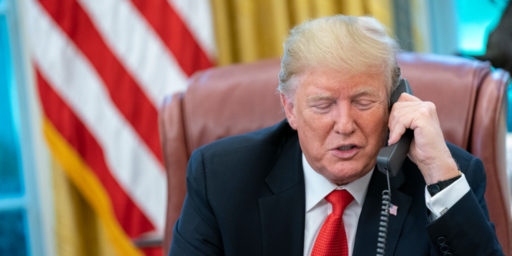
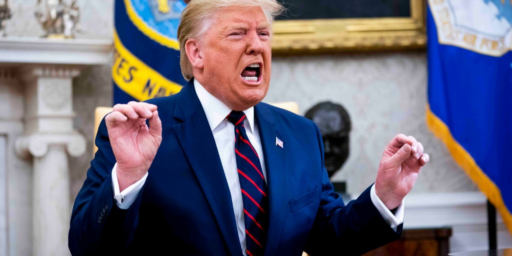
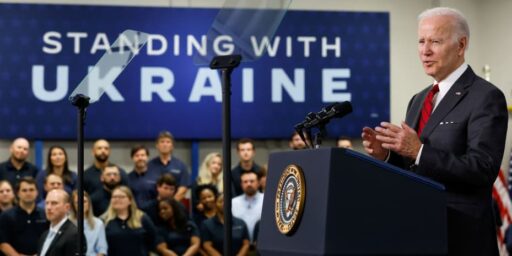
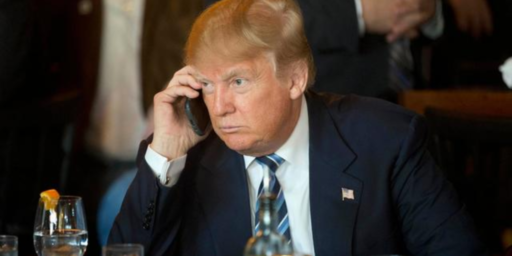
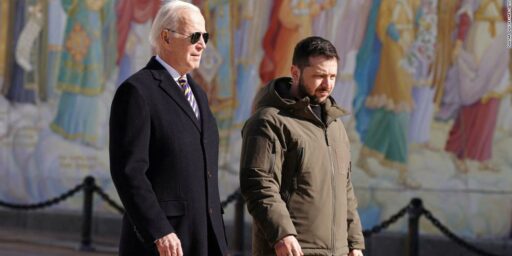
Every new fact that comes out only adds to the story we already know; fills in some blanks, adds new detail. The essential narrative has always stayed the same.
No one has presented any credible exculpatory evidence of any kind.
From the beginning the only thing in question is if Republicans will choose to stand with their Country and it’s Constitution, or to stand with a morbidly obese conman with a fake tan.
The Republican Party can deny reality because they have no belief in the rule of law unless they can use it in their favour. The question is whether there still exist any Republican lawmakers with any integrity at all–those willing to police their own side at least as fiercely as they police members of the Democratic Party.
This is a subtlety that will change no minds, but why, if the Administration wished to take an aggressive position on its authority and discretion under the Impoundment Control Act, could it not share even within the White House its reasons for wanting to take that position? Hell, this Administration is willing to take wildly aggressive (some might say baseless) positions on all sorts of executive authority. But for this they could not even articulate why to their own immediate staff?
Every single line of defense they come up with to exonerate trump, has a hole blown in it soon after they propose it. It’s like they say, “Oh, trump wouldn’t do that.” and he replies,
“Hold my beer, watch this!”
This makes no sense. Ukraine is dependent on U.S. support. If someone you hope to borrow from asks you to do something, are you being coerced? Certainly, if you are disinclined to do as asked. Did Zelensky feel coerced? Which was more important, to him and his country, preserving amicable relations with Biden (the poll front runner) or with Trump? In any event, the ultimate question (which some seem determined to evade) is whether Trump’s actions served the public interest as well as his private interest.
@andros: Let me answer and not evade your ultimate question – No, categorically no, as explained in detail by Fiona Hill et al. Trump’s actions affirmatively undermined America’s public interest as understood by anyone (apparently everyone) who had the slightest idea what dynamics were at work.
@andros:
Let’s all just stop feeding the J-nos troll.
He was banned for a reason.
I’m sure the moderators will get to it, again, soon enough.
@andros:
You have made that argument repeatedly in this forum and no one evades it.
Even if it is in thr national interest, his personal interest warrants a recusal.
@andros:
Thanks for pointing out again why Trump’s actions were impeachable.
Looking at the timeline and what was happening, the whistleblower complaint was why the aid was released then.
Cause and effect.
Once the complaint got out of IG’s office and into the House’s hands everyone suddenly realized that they’d sorta broke or subverted a bunch of laws in pushing Trump’s bonerfest on Biden and were withholding properly appropriated military funding to an ally in a hot war with Russia.
Red alert!
Straight news reporting can’t just come out and conclude that. They can strongly imply you look between the lines. They can walk you up to the very edge of the water.
I can.
The whistleblower complaint *caused* the release of the Ukrainian aid. It’s not just another entry on the timeline.
A war where Russia invaded, occupied, and annexed parts of Ukraine, stole ships, imprisoned Ukrainian sailors, their proxies shot down a civilian airliner with a few hundred souls, etc.
The Russians were definitely the baddies.
@andros:
Perhaps Zelensky was a honourable man, reluctant to lower himself to Trump’s deplorable level?
Perhaps he disliked being coerced by a threat to his country to traduce a man who had done said country no wrong, in order to serve the squalid self interest of a man inclined to show favour to his countries enemies? And who placed said self interest above the interest of both Ukraine and the United States.
Perhaps your sly sophistry is a thin cloak of rationality over a core of mendacity.
@andros:
Time to adjust your bullshit, genius. Giuliani was openly selling access to Trump to a Ukrainian prosecutor who properly told Giuliani to drop dead.
Far from fighting corruption, Trump brought the corruption.
To those who wax indignant at the mere thought of investigating the Bidens, or who aver that Trump had no “real” interest in exposing their dubious activities, I have nothing to say. Others I invite to weigh, in the scales of public interest, what Trump is alleged to have done.
It must be conceded, I think, that Biden does not place himself, by reason of his candidacy, “above the law.” This gives rise to the question whether allegedly delaying aid, as an inducement to get Zelensky committed to an investigation of corruption and the Bidens, was justified by the public interest. So what was at stake here? There was no immediate need of anti-tank weaponry, a ceasefire having been in effect since March, to facilitate negotiation of the Steinmeier Formula. The aid was characterized by Javonivitch as a “symbol” of support. Zelensky and Putin are preparing to meet. Any apprehension Trump may have caused here is outweighed, by far, by the public interest in investigating the Bidens’ obvious conflicts of interest.
@andros:
Stuff this strawman up your ass. None of us here are opposed to investigating the Bidens, if there’s actually something to investigate.
Of which you have provided zero actual evidence. Shit you suckled from the Fox News propaganda tit or known hack John Solomon does not count.
The rest of your comment is just the usual rehash of already-debunked bullshit you seem too stupid to understand gets you nowhere.
@andros:
Tell you what. If your cult leader agrees to let his people testify and stop obstructing justice, we’ll agree to investigate Biden. Deal?
@Michael Reynolds:
I thought maybe we could trade a Biden investigation for something useful…like Gun Control?
I love you brother…but please, stop feeding J-nos.
@andros: “Others I invite to weigh”
Oh, for god’s sake.
I invite you to go fuck yourself.
And have a happy Thanksgiving.
@Mikey:
In fairness, it’s not easy even for a dedicated cultie to keep up. I mean, poor @andros has to get busy preparing to throw Giuliani under the bus.
@andros:
This has been pointed out to you before, but here is the full quote:
On the ceasefire:
1.) it has been violated repeatedly.
2.) if the aid was delayed, it could actually embolden Russia to ignore the ceasefire. Javelin’s are sought as much for their deterrence potential as they are for battlefield use.
You now have zero excuse for continuing to take out of context the “symbolic value” part of her testimony. Until you stop doing that, you should take the word sophistry out of use, because that is all you do around here.
@andros:
Oh, you really do not want to go there. Thus far, in the impeachment threads we’ve been restricting discussion to his actual crimes — stuff that is illegal to do. If you add in a weighing of the negative effects on the public interest of all the other things he’s done that were technically legal but stupid/immoral/unethical/destructive, he’s so far underwater you’d need a bathyscaphe to read his tweets.
To all Trump toadies out there, some historical perspective from historian Kevin Kruse (lessons from Watergate): https://www.vanityfair.com/news/2019/11/trumps-toadies-should-take-note-watergate-says-everyone-goes-down?utm_source=nl&utm_brand=pol&utm_campaign=aud-dev&utm_mailing=Thematic_Ballot_11272019&utm_medium=email&bxid=5bd676d124c17c1048014950&cndid=38981805&utm_term=Thematic_Ballot_Subscribers
To sum up:
Trump did it.
He knew it was wrong.
He tried to cover it up.
He knew what he was doing.
He did it deliberately.
So much for the “too stupid to know what he was doing or that it was wrong” defense.
This still leaves intact the “But I dismantled the crime syndicate when we got caught!!” defense., as well as the “But I derived no benefit form my crimes!!” defense.
@Michael Reynolds:
And Giuliani’s associates Parnas and Fruman meet with Volodymyr Kolomoisky who tells them to get lost:
Trump has one remarkable achievement to his name, at any rate; enabling a Ukrainian oligarch to give lessons in ethics to agents of the personal representative of the President of the United States.
Isn’t this just a sign that the Whistleblower law works, and that there are appropriate checks and balances that ensure the right thing is done, and thus that this is all a partisan witch hunt? Many presidents reconsider actions after talking to their staff and lawyers.
Attempted bribery isn’t a crime. There’s no Nobel prize for Attempted Chemistry.
We need the Whistleblower’s name so we can praise him and tell him that he is a good boy. Or a good girl. Hopefully it will be easier to figure out the Whistleblower’s gender than that dog’s. That dog will be getting surgery ensure their gender will match the President’s statement.
——
Figured that it’s the holiday season, and I should try to give andros a better argument.
Trump Joke Time!
One fine day Joe decides he could use a brain transplant (don’t ask), so he goes into the brain store. Inside, there are small pedestals on tables, with brains under glass and carefully arranged spotlights.
A salesman approaches Joe and asks what he’s looking for. Joe asks for the most expensive brains, which the salesman is happy to show him.
“This, sir,” the salesman says, “belonged to a distinguished historian, aged 92. It goes for $500 a gram.”
“It’s nice, I guess,” says Joe. “But I’d like to see something better.”
“Certainly, sir. Here we have a fine specimen which belonged to an engineer, aged 67, for the very good price of $1,000 a gram. It excels at STEM, you know.”
“Not bad. not bad. But, tell me, what’s the most expensive one?”
“Ah, we have a very special brain, sir. it belonged to a businessman turned politician, aged 73, and goes for $100,000 a gram.”
Joe whistles. “That’s really high, isn’t it?”
“Not at all, sir. You see, it belonged to Donald Trump. It’s never been used.”
Hoocoodanode?
@gVOR08: The “hoocoodanode” spell should be entered into the history of the Trump age.
@andros: Why dont you pick up you keyboard and smash it over your head. You’re ruining the scrolling experience here with this bullshit. Everytime I come here lately, you’re tripping over yourself to be the first to stuff Trump’s Co(k down your throat. Its embarrassing.
Oh….Happy Thanksgiving
@andros:
This isn’t complicated: who better to leverage into doing your dirty work than someone powerless to resist? This really isn’t that complicated.
It didn’t. Period.
The server issue is clearly in Trump’s interest (and has the added bonus of being an utterly bogus theory).
Specifically looking into the Bidens is about helping Trump. It is not, in any way, the way a general approach to corruption would be undertaken (and it has the added bonus of no evidence of wrongdoing).
I would note that you cannot ignore the two asks as if the server inquiry doesn’t matter (as you have been doing for days).
No one has been avoiding this question. I do appreciate that you have accepted my framing of this issue, however, as one about public v. private interest.
This behavior by Trump underscores a guilty state of mind. If withholding the aid was a public policy action, why would the whistleblower’s report affect his behavior? Why start running around yelling “no quid pro quo” and “I want nothing” and insisting on how “perfect” the call was if there was nothing wrong with his initial behavior?
@Daryl and his brother Darryl:
Please stop with the Jenos taunts, it is unproductive. And you don’t want to engage him, don’t.
Yes, he is being pedantic. And yes, it may be unproductive to engage. But he is staying on the topic of the threads–and the original Jenos was eventually booted for derailing them.
It is up to the moderators to enforce the rules, and it gets tiresome being told how to engage in that activity. If one really thinks there is a problem, please send one of us (or all three of us) an e-mail.
As annoying as andros’ lack of understanding is, he/she has not been rude and has not deviated from the topics at hand. And I have no evidence that he/she is a previously banned participant.
I don’t recall, for example, Jenos being unable to post links. Further, I find there to be rhetorical differences.
I would note that the purpose of the bans is not/was not just to get rid of annoying commenters. It is to get rid of commenters who can’t engage, are rude, or who totally derail the comments (among other things).
Could we please let this go?
Thanks.
@andros:
Which describes absolutely no one in these conversations.
I have no problem with investigating the Bidens. I just want a) evidence that suggests an investigation is warranted, and b) I would want it done through proper processes.
Neither of those things should be too much to ask.
@andros:
Let me come at this from a different direction than @Steven L. Taylor: because you’ve provided a great example of why Pelosi is right to describe this as bribery.
This situation is no different than a building inspector asking for fifty bucks to sign off on my wiring. That I‘m dependent on him is not mitigating. He could hardly ask me for a bribe if I didn’t need something from him, could he?And why he wants the money also doesn’t matter. He may have wanted, in the public interest, to put it in the Building Department toys for tots fund. It’s still soliciting a bribe.
The inspector may claim he has some policy issue with the electrical code. Doesn’t matter. He may say I’m paying him to ignore some violation. Doesn’t matter. He may get caught, as in this case, before the money actually changed hands. Doesn’t matter. Pelosi has the correct formulation. Trump solicited a bribe. End of story.